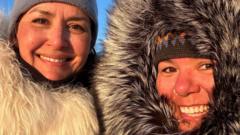Kathy Kettler outlines the distinct hurdles of running a campaign in Canada's largest federal district, Nunavut, where harsh weather and community dynamics shape the electoral experience.
Elections in Canada's North: A Unique Challenge Amidst Icy Terrain

Elections in Canada's North: A Unique Challenge Amidst Icy Terrain
Campaigning in Nunavut presents extraordinary challenges and cultural nuances for candidates.
In the vast expanse of Canada’s northern territory of Nunavut, elections pose distinct challenges, as highlighted by Kathy Kettler, campaign manager for Liberal candidate Kilikvak Kabloona. Spanning 1.8 million sq km (695,000 sq miles), Nunavut is home to roughly 40,000 residents, who are represented by a single parliamentarian. Kettler notes, "Nunavut is at least three times the size of France," emphasizing its immense size and the difficulties this presents for political campaigning.
Traveling between its 25 remote communities primarily by air, Kettler shared her recent experience of covering 1,700 km (1,050 miles) within a single day, visiting multiple locations including Pangnirtung, Iqaluit, Rankin Inlet, and Arviat. The region’s weather adds a layer of complexity, as Kettler courageously canvassed door-to-door in -24C (-11F) temperatures, a stark contrast to southern Canada.
Moreover, Kettler described the cultural differences that influence campaign strategies and personal interactions. In Nunavut, visitors often enter homes without knocking, which she pointed out can feel awkward even for an Inuk individual like herself, as it diverges from the norms of other regions. Campaigning also necessitates the translation of materials, as Inuktitut is the primary language spoken by many residents.
The pressing issues faced by Nunavummiut are far removed from those trending in national conversations. While Arctic security and sovereignty dominate discussions elsewhere, local challenges such as food security and access to clean water take precedence in this northern territory. Kettler related her own experiences of boiling water for drinking and emphasized the sacrifices many make to afford food.
The election landscape features several contenders, including incumbent Lori Idlout of the New Democratic Party (NDP) and Conservative candidate James Arreak. Conducting the election in such a challenging environment falls to returning officer Jean-Claude Nguyen, who highlighted the logistical difficulties of ensuring ballots reach remote locations, including gold mines. Notably, he recounted a humorous incident from the previous election when a raven damaged a ballot box—but, fortunately, no ballots were lost.
Despite these formidable challenges, Kettler expressed admiration for the resilient spirit of Nunavut’s people. "The generosity, love, and care that people have for each other in every community shines through," she stated, reinforcing the significance of human connection in the electoral process in this unique part of Canada.
Traveling between its 25 remote communities primarily by air, Kettler shared her recent experience of covering 1,700 km (1,050 miles) within a single day, visiting multiple locations including Pangnirtung, Iqaluit, Rankin Inlet, and Arviat. The region’s weather adds a layer of complexity, as Kettler courageously canvassed door-to-door in -24C (-11F) temperatures, a stark contrast to southern Canada.
Moreover, Kettler described the cultural differences that influence campaign strategies and personal interactions. In Nunavut, visitors often enter homes without knocking, which she pointed out can feel awkward even for an Inuk individual like herself, as it diverges from the norms of other regions. Campaigning also necessitates the translation of materials, as Inuktitut is the primary language spoken by many residents.
The pressing issues faced by Nunavummiut are far removed from those trending in national conversations. While Arctic security and sovereignty dominate discussions elsewhere, local challenges such as food security and access to clean water take precedence in this northern territory. Kettler related her own experiences of boiling water for drinking and emphasized the sacrifices many make to afford food.
The election landscape features several contenders, including incumbent Lori Idlout of the New Democratic Party (NDP) and Conservative candidate James Arreak. Conducting the election in such a challenging environment falls to returning officer Jean-Claude Nguyen, who highlighted the logistical difficulties of ensuring ballots reach remote locations, including gold mines. Notably, he recounted a humorous incident from the previous election when a raven damaged a ballot box—but, fortunately, no ballots were lost.
Despite these formidable challenges, Kettler expressed admiration for the resilient spirit of Nunavut’s people. "The generosity, love, and care that people have for each other in every community shines through," she stated, reinforcing the significance of human connection in the electoral process in this unique part of Canada.





















